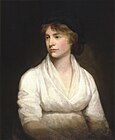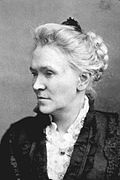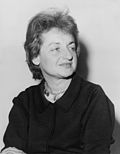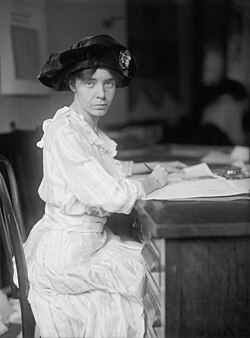Portal:Feminism
The Feminism Portal


Feminism is a range of socio-political movements and ideologies that aim to define and establish the political, economic, personal, and social equality of the sexes. Feminism holds the position that modern societies are patriarchal—they prioritize the male point of view—and that women are treated unjustly in these societies. Efforts to change this include fighting against gender stereotypes and improving educational, professional, and interpersonal opportunities and outcomes for women.
Originating in late 18th-century Europe, feminist movements have campaigned and continue to campaign for women's rights, including the right to vote, run for public office, work, earn equal pay, own property, receive education, enter into contracts, have equal rights within marriage, and maternity leave. Feminists have also worked to ensure access to contraception, legal abortions, and social integration; and to protect women and girls from sexual assault, sexual harassment, and domestic violence. Changes in female dress standards and acceptable physical activities for women have also been part of feminist movements.
Many scholars consider feminist campaigns to be a main force behind major historical societal changes for women's rights, particularly in the West, where they are near-universally credited with achieving women's suffrage, gender-neutral language, reproductive rights for women (including access to contraceptives and abortion), and the right to enter into contracts and own property. Although feminist advocacy is, and has been, mainly focused on women's rights, some argue for the inclusion of men's liberation within its aims, because they believe that men are also harmed by traditional gender roles. Feminist theory, which emerged from feminist movements, aims to understand the nature of gender inequality by examining women's social roles and lived experiences. Feminist theorists have developed theories in a variety of disciplines in order to respond to issues concerning gender.
Numerous feminist movements and ideologies have developed over the years, representing different viewpoints and political aims. Traditionally, since the 19th century, first-wave liberal feminism, which sought political and legal equality through reforms within a liberal democratic framework, was contrasted with labour-based proletarian women's movements that over time developed into socialist and Marxist feminism based on class struggle theory. Since the 1960s, both of these traditions are also contrasted with the radical feminism that arose from the radical wing of second-wave feminism and that calls for a radical reordering of society to eliminate patriarchy. Liberal, socialist, and radical feminism are sometimes referred to as the "Big Three" schools of feminist thought.
Since the late 20th century, many newer forms of feminism have emerged. Some forms, such as white feminism and gender-critical feminism, have been criticized as taking into account only white, middle class, college-educated, heterosexual, or cisgender perspectives. These criticisms have led to the creation of ethnically specific or multicultural forms of feminism, such as black feminism and intersectional feminism. (Full article...)
Featured article
Featured picture
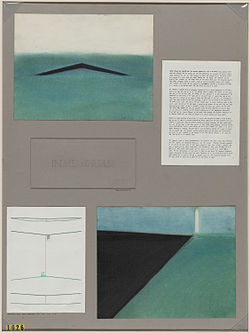
Maya Lin's original competition submission for the Vietnam Veterans Memorial in Washington, D.C.. Originally designed as a student project at Yale University's School of Architecture in 1981, the memorial is a black granite wall, in the shape of a V, on which the names of American servicemen killed or missing in action from the Vietnam War are inscribed. The architect hoped that "these names, seemingly infinite in number, [would] convey the sense of overwhelming numbers, while unifying these individuals into a whole."
In this month
- March 1918 – First publication of Married Love, an important and influential sex manual by Marie Stopes, a Scottish author, eugenicist, campaigner for women's rights and pioneer in the field of family planning
- March 1976 – First Take Back the Night march was held in Belgium by women attending the International Tribunal on Crimes against Women
- 2 March 1897 – Birth of Shidzue Katō, Japanese feminist who was a pioneer in the birth control movement and one of the first women elected to the Diet of Japan
- 8 March – International Women's Day (pictured) is a day to celebrate the economic, political, and social achievements of women
- 28 March 1794 – Marquis de Condorcet, who died during the French Revolution, argued for free and equal public education as well as for equal rights for women and people of all races
Selected quote
Related portals
Featured biography
Did you know (auto-generated) -

- ... that the retelling of stories can focus on female characters to reflect the feminist perspective?
- ... that after dying in her daughter's arms in an asylum in 1897, Maria Trubnikova was remembered as the "heart and soul" of feminist activism in Russia?
- ... that Margareth Rago seeks to establish a methodology for what she calls "feminist science"?
More "Did you know"
- ...that in the Big Runaway during the American Revolution in Pennsylvania in 1778, Rachel Silverthorn (pictured) rode to warn settlers on Muncy Creek of impending attack when no man would?
- ...that the role of Kanephoros was the most prominent public office a girl or woman could hold in ancient Athens?
- ... that Henry Fielding praised Jane Collier, author of An Essay on the Art of Ingeniously Tormenting and The Cry, for her "understanding more than female, mixed with virtues almost more than human"?
General images -
WikiProjects
Topics
Categories
Featured content
| This is a list of recognized content, updated weekly by JL-Bot (talk · contribs) (typically on Saturdays). There is no need to edit the list yourself. If an article is missing from the list, make sure it is tagged (e.g. {{WikiProject Feminism}}) or categorized correctly and wait for the next update. See WP:RECOG for configuration options. |
Featured articles
 Vidya Balan
Vidya Balan Louise Bryant
Louise Bryant Josephine Butler
Josephine Butler Control (Janet Jackson album)
Control (Janet Jackson album) Marjory Stoneman Douglas
Marjory Stoneman Douglas Female genital mutilation
Female genital mutilation Anna Filosofova
Anna Filosofova Margaret Fuller
Margaret Fuller Emma Goldman
Emma Goldman Inter-Allied Women's Conference
Inter-Allied Women's Conference Janet Jackson
Janet Jackson Kahaani
Kahaani Lise Meitner
Lise Meitner Olive Morris
Olive Morris Mothers of the Disappeared
Mothers of the Disappeared Jessie Murray
Jessie Murray Margaret Murray
Margaret Murray Florence Nagle
Florence Nagle Emmeline Pankhurst
Emmeline Pankhurst Katy Perry
Katy Perry Adelaide Anne Procter
Adelaide Anne Procter Susan B. Anthony dollar
Susan B. Anthony dollar Taylor Swift
Taylor Swift Maria Trubnikova
Maria Trubnikova Harriet Tubman
Harriet Tubman A Vindication of the Rights of Men
A Vindication of the Rights of Men A Vindication of the Rights of Woman
A Vindication of the Rights of Woman Emma Watson
Emma Watson We Can Do It!
We Can Do It! Wife selling (English custom)
Wife selling (English custom) Mary Wollstonecraft
Mary Wollstonecraft École Polytechnique massacre
École Polytechnique massacre
Featured lists
Good articles
 Nineteenth Amendment to the United States Constitution
Nineteenth Amendment to the United States Constitution Ángela Acuña Braun
Ángela Acuña Braun Chimamanda Ngozi Adichie
Chimamanda Ngozi Adichie Susan B. Anthony II
Susan B. Anthony II Elena Arizmendi Mejía
Elena Arizmendi Mejía Trinidad Arroyo
Trinidad Arroyo Aurora (Sleeping Beauty)
Aurora (Sleeping Beauty) Ay mamá
Ay mamá Rachel Barrett
Rachel Barrett Gerlin Bean
Gerlin Bean Belle (Disney character)
Belle (Disney character) Beyoncé
Beyoncé Birth control
Birth control Jex Blackmore
Jex Blackmore Jeni Bojilova-Pateva
Jeni Bojilova-Pateva Virginia Bolten
Virginia Bolten Tawana Brawley rape hoax
Tawana Brawley rape hoax Build a Bitch
Build a Bitch Can't Hold Us Down
Can't Hold Us Down Claudia Cardinale
Claudia Cardinale A Catholic Statement on Pluralism and Abortion
A Catholic Statement on Pluralism and Abortion Rita Cetina Gutiérrez
Rita Cetina Gutiérrez Cherry Wine (Hozier song)
Cherry Wine (Hozier song) Child prostitution
Child prostitution Lara Croft
Lara Croft Cutting the Mustard
Cutting the Mustard Lucinda Lee Dalton
Lucinda Lee Dalton Emily Davies
Emily Davies Maymie de Mena
Maymie de Mena 2012 Delhi gang rape and murder
2012 Delhi gang rape and murder The Dirty Picture
The Dirty Picture Elisabeth Dmitrieff
Elisabeth Dmitrieff Double burden
Double burden Anne Dallas Dudley
Anne Dallas Dudley Andrea Dworkin
Andrea Dworkin Mary Beth Edelson
Mary Beth Edelson Lilian Faithfull
Lilian Faithfull Feminism
Feminism Feminism in Russia
Feminism in Russia Feminist Improvising Group
Feminist Improvising Group Feminist economics
Feminist economics María Teresa Ferrari
María Teresa Ferrari Princess Fiona
Princess Fiona Jane Fonda
Jane Fonda Forced sterilization in Peru
Forced sterilization in Peru Marge Frantz
Marge Frantz Edith Garrud
Edith Garrud Kirsten Gillibrand
Kirsten Gillibrand Glorieta de las mujeres que luchan
Glorieta de las mujeres que luchan Laura de Force Gordon
Laura de Force Gordon Government Hooker
Government Hooker Güzel İstanbul
Güzel İstanbul H.W. v. France
H.W. v. France Hilda Heine
Hilda Heine Aileen Hernandez
Aileen Hernandez Hitachi Magic Wand
Hitachi Magic Wand Hole (band)
Hole (band) Howl's Moving Castle (film)
Howl's Moving Castle (film) Clair Huxtable
Clair Huxtable I'll Make a Man Out of You
I'll Make a Man Out of You Incel
Incel Independent Women's Forum
Independent Women's Forum Jane Collective
Jane Collective Jasmine (Aladdin)
Jasmine (Aladdin) Doris Sands Johnson
Doris Sands Johnson India Juliana
India Juliana Kim Possible
Kim Possible Gina Krog
Gina Krog Lady Like
Lady Like Lady Like (song)
Lady Like (song) Astrid Lindgren
Astrid Lindgren Love, Loss, and What I Wore
Love, Loss, and What I Wore Paulina Luisi
Paulina Luisi Madonna
Madonna Malouma
Malouma Marie of Romania
Marie of Romania Bertha Mason (suffragist)
Bertha Mason (suffragist) Maria Mies
Maria Mies Kate Millett
Kate Millett Moana (character)
Moana (character) Mother's Little Helper
Mother's Little Helper Mr. Lady Records
Mr. Lady Records Mulan (Disney character)
Mulan (Disney character) Nala (The Lion King)
Nala (The Lion King) Louise Nevelson
Louise Nevelson No One Killed Jessica
No One Killed Jessica Paper or Plastic (song)
Paper or Plastic (song) Patricia Paputsakis
Patricia Paputsakis Irene Parlby
Irene Parlby Roy Earl Parrish
Roy Earl Parrish Part of Your World
Part of Your World Planned Parenthood
Planned Parenthood Kim Possible (character)
Kim Possible (character) Pussy Riot
Pussy Riot Funmilayo Ransome-Kuti
Funmilayo Ransome-Kuti A Rape on Campus
A Rape on Campus Megan Rapinoe
Megan Rapinoe Rasan (organization)
Rasan (organization) Marcela Revollo
Marcela Revollo Tessie Reynolds
Tessie Reynolds Deolinda Rodrigues
Deolinda Rodrigues Nina Salaman
Nina Salaman Zainab Salbi
Zainab Salbi Margaret Sanger
Margaret Sanger Linda Sarsour
Linda Sarsour Cher Scarlett
Cher Scarlett Rosika Schwimmer
Rosika Schwimmer Seneca Falls Convention
Seneca Falls Convention Shadowland (song)
Shadowland (song) Chava Shapiro
Chava Shapiro Manal al-Sharif
Manal al-Sharif Mary Stuart Smith
Mary Stuart Smith Valerie Solanas
Valerie Solanas Miriam Soljak
Miriam Soljak Hope Solo
Hope Solo Elizabeth Cady Stanton
Elizabeth Cady Stanton Shelby Starner
Shelby Starner Gloria Steinem
Gloria Steinem Jessie Stephen
Jessie Stephen Doris Stevens
Doris Stevens Cecilia Suárez
Cecilia Suárez Tailhook scandal
Tailhook scandal Thung Sin Nio
Thung Sin Nio Nino Tkeshelashvili
Nino Tkeshelashvili A Toast to Men
A Toast to Men Lana Turner
Lana Turner Mary Two-Axe Earley
Mary Two-Axe Earley Ugly (Fantasia song)
Ugly (Fantasia song) Veiqia
Veiqia WAP (song)
WAP (song) Jean Walton
Jean Walton Abby Wambach
Abby Wambach When a man argues against two beautiful ladies like this, they are going to have the last word
When a man argues against two beautiful ladies like this, they are going to have the last word The Woman's Bible
The Woman's Bible Optional Protocol to the Convention on the Elimination of All Forms of Discrimination Against Women
Optional Protocol to the Convention on the Elimination of All Forms of Discrimination Against Women Women in early modern Scotland
Women in early modern Scotland Women in classical Athens
Women in classical Athens Women's International Democratic Federation
Women's International Democratic Federation Women's March on Portland
Women's March on Portland Women's club movement in the United States
Women's club movement in the United States Women's suffrage in Wales
Women's suffrage in Wales Xue Susu
Xue Susu Year 24 Group
Year 24 Group Voltairine de Cleyre
Voltairine de Cleyre
Featured pictures
-
Alice Manfield - Guide Alice, Mt Buffalo, c1900-30, SLV
-
Alice Park - Records of the National Woman's Party
-
Alice Paul (1915) by Harris & Ewing
-
Angela Davis in a half-length portrait by Bernard Gotfryd - crop
-
Anne Dallas Dudley LOC
-
Avril de Sainte-Croix - Restored, cropped
-
Bertha Lutz 1925
-
Cabinet Card of Sojourner Truth - Collection of the National Museum of African American History and Culture
-
Convicts Lunatics and Women! Have No Vote for Parliament, ca. 1907-1918
-
Dr. Caroline Spencer 275029v
-
Ethel Smyth
-
Frances Benjamin Johnston, Self-Portrait (as "New Woman"), 1896
-
Fredrikke Mørck
-
George Charles Beresford - Virginia Woolf in 1902 - Restoration
-
Henrietta Rodman from the George Grantham Bain Collection
-
Henry Mayer, The Awakening, 1915 Cornell CUL PJM 1176 01 - Restoration
-
Hester Jeffrey
-
Hubertine Auclert 1910
-
Iris Calderhead
-
Joy Young Rogers outside the White House
-
Lucretia Mott, signed photo, by F. Gutekunst
-
Mabel Vernon, c. 1917, by Edmonston, Washington, D.C.
-
Marguerite Durand 1910 - Restoration
-
Marie Stopes in her laboratory, 1904 - Restoration
-
Mary Garrity - Ida B. Wells-Barnett - Google Art Project - restoration crop
-
Millicent Fawcett
-
Mrs. Crystal Eastman Benedict by Edmonston, Washington, D.C.
-
Mrs. Lillian Ascough, chairman of the Connecticut branch of the Woman's Party
-
Mrs. Pauline Adams 147002v
-
Portrett av Gina Krog (6276081582) - Restoration
-
Poster by Anna Soós Korànyi for the Seventh Conference of the International Woman Suffrage Alliance
-
Ray Strachey restored
-
Sojourner Truth, 1870 (cropped, restored)
-
Victoria Claflin Woodhull by Mathew Brady - Oval Portrait
-
Voltairine de Cleyre (Age 35)
-
We Can Do It! NARA 535413 - Restoration 2
Featured portals
Good topics
Things you can do
- Add {{Portal|Feminism}} to the See also section of Feminism-related articles.
- Tag the talk pages of Feminism-related articles with {{WikiProject Feminism}}
- Join Wikipedia:WikiProject Feminism
- Cleanup: A cleanup listing for this project is available, updated by CleanupWorklistBot.
- Notability: Articles with notability concerns, listed at WikiProject Notability
- Rate the Unassessed Gender Studies articles in the Gender Studies WikiProject.
- Requested articles: Requested articles on Feminism, Requested articles on Feminist figures
- Stubs: Gender studies stubs, Feminism stubs, Women's rights activist stubs
Wikimedia
The following Wikimedia Foundation sister projects provide more on this subject:
-
Commons
Free media repository -
Wikibooks
Free textbooks and manuals -
Wikidata
Free knowledge base -
Wikinews
Free-content news -
Wikiquote
Collection of quotations -
Wikisource
Free-content library -
Wikiversity
Free learning tools -
Wiktionary
Dictionary and thesaurus




